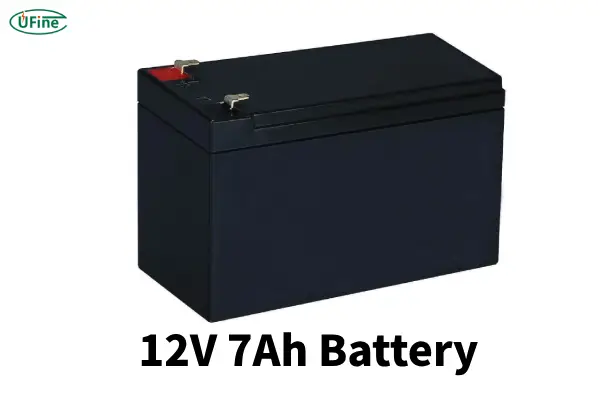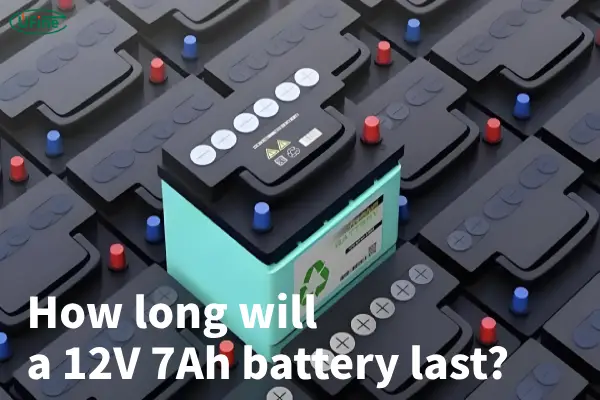Whether you’re powering a home security system, medical device, or even a small electric vehicle, choosing the right battery can be a crucial decision. One of the most widely used options is the 12V 7Ah battery. With its compact design, versatility, and affordability, it’s a go-to solution for a range of applications.
However, not all 12V 7Ah batteries are created equal. With various types on the market—each offering unique benefits—it can be tough to determine which one is best for you. In this detailed guide, we will explore the different types of 12V 7Ah batteries, their strengths and weaknesses, how long they last, their applications, and which one might be the best fit for your needs. By the end, you’ll have a deeper understanding to make an informed decision and choose the right 12V 7Ah battery for your situation.
Part 1. Types of 12V 7Ah batteries
When we talk about a 12V 7Ah battery, we’re primarily referring to the voltage (12 volts) and the capacity (7 amp-hours). But the chemistry inside the battery varies, leading to different types. Each has specific benefits and drawbacks that suit different applications. Let’s dive into the main types:
Lead-Acid Batteries
The most common type is the lead-acid battery. These batteries have been around for more than 100 years and have earned a reputation for being reliable and cost-effective. They’re often used in applications such as emergency lighting systems, UPS (Uninterruptible Power Supply) units, and security systems.
- Sealed Lead-Acid (SLA) Batteries: These are maintenance-free versions of traditional lead-acid batteries. They are sealed, meaning you don’t have to worry about leaks or topping off the battery with water. SLA batteries are ideal for indoor use, making them a popular choice for UPS systems and medical equipment.
Pros:
- Affordable: Lead-acid batteries are generally cheaper than their counterparts, making them ideal for budget-conscious buyers.
- Durable: They can withstand moderate usage over time and are highly reliable for low-power applications.
Cons:
- Heavy: These batteries are relatively heavy, making them less suitable for portable devices.
- Shorter lifespan: Lead-acid batteries usually last around 3 to 5 years.
Lithium-Ion (LiFePO4) Batteries
LiFePO4 batteries are becoming increasingly popular due to their higher energy density and lighter weight. If you need a battery for portable applications, such as electric scooters or portable medical devices, a lithium-ion 12V 7Ah battery might be your best bet.
Pros:
- Lightweight: Lithium-ion batteries weigh significantly less than lead-acid ones, making them easier to transport.
- Longer lifespan: Lithium-ion batteries can last up to 10 years or more with proper care.
- Fast charging: They tend to charge faster, reducing downtime between uses.
Cons:
- More expensive: Lithium-ion batteries tend to have a higher upfront cost, though their longevity can balance this out over time.
- Temperature sensitivity: These batteries don’t perform as well in extreme heat or cold.
Nickel Metal Hydride (NiMH) Batteries
NiMH batteries are another option, though they are less common for a 12V 7Ah capacity. They are typically used in specialized applications where moderate performance is needed.
Pros:
- Rechargeable and environmentally friendly: They don’t contain harmful heavy metals like lead or cadmium.
- Safe for regular use: NiMH batteries are generally safer than lithium-ion, especially under harsh conditions.
Cons:
- Shorter lifespan: They don’t last as long as lithium-ion batteries and usually have lower energy density.
Part 2. 12V 7Ah battery size and weight
Another important factor to consider when choosing a 12V 7Ah battery is its size and weight, especially if you’re using it in a portable or space-constrained application. The size and weight of the battery can vary depending on the type you choose.
Lead-Acid Battery Size and Weight
For a standard lead-acid 12V 7Ah battery, you’re typically looking at dimensions of around 5.94 x 2.56 x 3.7 inches (151 x 65 x 94 mm). These batteries are on the heavier side, generally weighing between 5 to 6 pounds (2.3 to 2.7 kg). If your application doesn’t require moving the battery often, such as in a UPS system or a home alarm system, the weight might not be an issue.
LiFePO4 Battery Size and Weight
LiFePO4 batteries are lighter, often weighing between 3.5 to 4 pounds (1.6 to 1.8 kg). They are more compact as well due to their higher energy density, making them a perfect fit for portable medical devices or electric scooters where space and weight are critical.
Part 3. How to choose a charger for a 12V 7Ah battery?
Choosing the right charger is critical for ensuring the longevity of your battery. Here are the two primary types of chargers:
Standard Chargers
Standard chargers supply a constant current to the battery and are the most basic and affordable option. However, they do not offer protection against overcharging, which can shorten your battery’s lifespan, especially for lead-acid batteries.
Smart Chargers
A smart charger adjusts the current based on the battery’s voltage and condition, offering features like overcharge protection and faster charging times. They are particularly beneficial for lithium-ion batteries, which can be sensitive to improper charging methods.
When choosing a charger, it’s important to ensure that it matches your battery’s chemistry and voltage requirements. Using the wrong charger can severely damage your battery.
Part 4. How long will a 12V 7Ah battery last?
Battery lifespan varies significantly depending on the type of battery you choose and how it is used.
- Lead-acid batteries typically last around 3 to 5 years with proper care.
- Lithium-ion batteries, on the other hand, can last up to 10 years or more.
For example, if you’re using a lead-acid battery in a security system with minimal cycling, it could last closer to 5 years. However, if used in a UPS that experiences frequent discharges, it may wear out sooner.
Lithium-ion batteries, due to their higher cycle life, tend to outlast lead-acid batteries by a significant margin, making them a better option for high-use, portable devices like electric scooters.
Part 5. Where is a 12V 7Ah battery used?
The 12V 7Ah battery is widely used in various applications. Some of the most common uses include:
- Uninterruptible Power Supply (UPS): Provides backup power to ensure uninterrupted operation of computers, servers, or other critical equipment.
- Emergency Lighting: Powers emergency lights during blackouts to ensure safety in homes, offices, and public buildings.
- Medical Devices: Portable medical devices, such as defibrillators and infusion pumps, often rely on 12V 7Ah batteries for on-the-go usage.
- Electric Scooters: Many electric scooters use 12V 7Ah batteries for their compact size and sufficient power.
- Home Security Systems: Provide a reliable power source for home alarm systems to keep them running in case of a power outage.
Part 6. Conclusion
Choosing the right 12V 7Ah battery depends on your specific needs and application. Whether you need a cost-effective solution like a lead-acid battery for backup power in your security system or a lightweight lithium-ion battery for your portable medical device, understanding the key differences between battery types will help you make an informed decision.
While lead-acid batteries are affordable and reliable, lithium-ion batteries offer a longer lifespan, making them a solid long-term investment for high-use applications. By selecting the right charger and following proper maintenance practices, you can extend the life of your 12V 7Ah battery and get the most value out of your purchase.
So, what’s the best 12V 7Ah battery for you? It all comes down to how and where you plan to use it.
Related Tags:
More Articles

How to Choose the Best Floor Scrubber Battery for Commercial Cleaning?
Selecting the ideal floor scrubber battery ensures a long runtime, rapid charging, and minimal maintenance for efficient commercial cleaning operations.
Battery for Blower vs Battery for Leaf Vacuum: Which One Should You Choose?
Battery for blower vs leaf vacuum—learn the key differences in power, fit, and runtime to choose the right battery for your outdoor tool needs.
How to Choose the Right Battery for Blower?
Choosing the right blower battery? Consider voltage, capacity, chemistry & usage. This guide helps match the best battery for peak performance.
How to Choose the Best Insulated Battery Box for Lithium Batteries?
Choosing the Best Insulated Battery Box for Lithium Batteries? Discover key factors such as size, material, and safety for optimal protection and performance.
7 Critical Elements on a Lithium Battery Shipping Label
What must be on a lithium battery shipping label? Learn 7 key elements to ensure safety, legal compliance, and correct handling across all transport modes.





